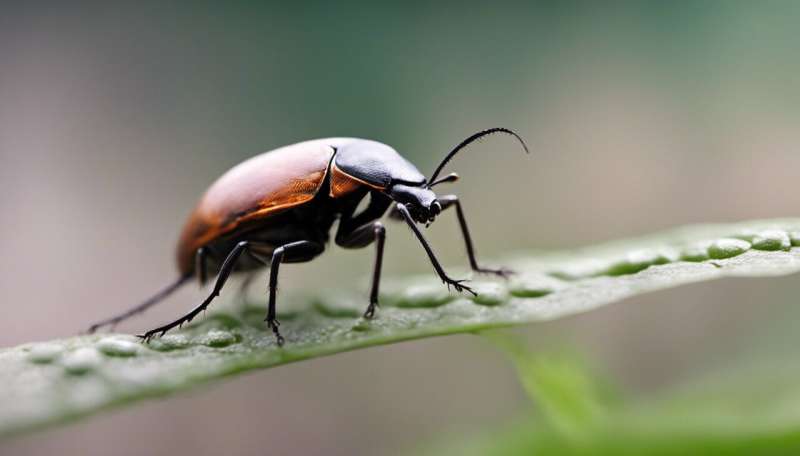Learning from beetles, nature's master farmers

The sustainable production of pathogen-free crops is one of mankind's most pressing concerns, given projected population growth and the threat posed by climate change to arable land. Incredibly, the study of a species of unassuming tree-dwelling beetles could hold some answers.
Certain species of beetles have been successfully farming and harvesting fungi for at least 40 million years, keeping destructive bacteria at bay and developing a lasting and sustainable relationship with both their crop and environment. The success of the tree-dwelling ambrosia beetles could therefore hold lessons for humans who have been cultivating crops for a mere 10 000 years.
A lesson in sustainable farming
The ambrosia beetles, which live in social groups inside trees, transport fungi spores from their natal nest when they settle new trees. The spores are then 'planted', and once the fungus has developed fruiting bodies, these are harvested. Just like humans, the beetles must deal with pathogens that can harm their crops and ensure a sustainable, healthy environment for crop growing.
'My ultimate goal in this project has been to identify possible solutions that can be taken up by scientists and researchers in forestry and agriculture,' explains project coordinator for the EU-funded FARMING IN BEETLES project, Dr Peter Biedermann from the Max Planck Institute for Chemical Ecology in Germany. 'Just like in the beetle nests I am studying, fungal pathogens pose a huge threat to human agriculture, so understanding the beetles' success might provide insights that are relevant for our agriculture as well.'
Launched in March 2015, the two-year project, funded through a Marie Curie Intra-European Fellowship grant, has already uncovered new findings. The relationship between the beetle and the fungus involves not just one but several fungus species, which are likely planted within the nest in order, i.e. in a crop rotation scheme that would be familiar to human farmers. Most remarkably several bacteria play a major role both in inducing fruiting bodies and in fighting pathogens.
'It was also really surprising to find out that in the fruit-tree pinhole borer, the ambrosia beetle species that I mainly study, the major fungus crop consists of a single strain that can be found across the whole of Europe,' says Biedermann. 'Humans also grow a few very successful cultivars of their crops. Another fascinating result was that fungi are only found in beetles that colonise dead trees. Beetles that dwell in trees that are still alive do not carry fungi as they would probably kill their host tree.'
The project also built on the discovery that plant growth can be enhanced through certain microorganisms (endophytes) that live within the plant tissue and can help to repel herbivores. 'Uncovering the role of bacteria in the beetles' gardens might help us to understand the role of endophytes associated with our crops as well,' says Biedermann. 'Finally, antibiotics produced by bacteria also seem to play a major role within the beetles' nests, so there is the potential to perhaps transfer knowledge for medical applications or even detect novel antibiotic substances.'
Applying new techniques
After confirming the complexity of the beetle-fungus system, the remainder of the project, due for completion in February 2017, will be focused on unravelling these interactions in more detail. 'For example, what chemical substances are involved, which of them are produced by the bacteria and which by the fungi themselves?' asks Biedermann. 'Which bacterial species occur within the nests; are they always the same or is there variation across the geographic range of ambrosia beetles?'
Biedermann also wants to explore in depth the parallels between beetle and human agriculture, to see what these two – traditionally distinct – research fields can learn from each other. 'I want to bring researchers that study insect farming and agronomists together, with the aim of stimulating each other´s research,' he says. 'For example, it would be very interesting if we could apply bacteria to our crops in order to produce antibiotics against crop pests. This is exactly what the farming beetles seem to do.'
More information: Project page: cordis.europa.eu/project/rcn/188001_en.html
Provided by CORDIS




















